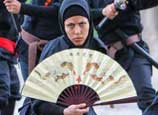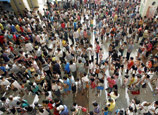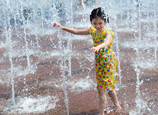
Introduction:
The Chengde Mountain Resort, also known as the "Rehe Xanadu," is located in the long and narrow valley to north of the Chengde City in Hebei Province in the north of China, and covers 584 hectares. The construction of the resort started in the 42nd year of the Kangxi Emperor (1703) and was suspended during the Yongzheng Emperor period (1723—1736). Then, the construction continued in the sixth year of the Qianlong Emperor (1741), and 36 Qianlong (1736—1796) scenic spots and the outer eight temples were added. The construction of the resort took about 90 years, which was the prime period of the Qing Dynasty. A lot of skillful architectural workers and masters participated in the construction. In the 50th year of the Kangxi Emperor (1662—1723), the Emperor personally wrote the resort name on the top of the Meridian Gate. The mountain resort consists of two regions, the palace region and the scenic region.
The palace region is in the southern part of the resort. Many well-designed buildings stand upright there and it looks like a smaller "Forbidden City." It has four architectural groups, the Main Palace, the Pine Crane Palace, the Wan He Song Feng Palace and the Eastern Palace. The Main Palace was the place where the Emperor dealt with political affairs, rested and held important ceremonies. The pine and crane means longevity in Chinese culture and the Pine Crane Palace in the Qianlong Emperor period was where the Emperor's mother lived. The Wan Ke Song Feng Palace was the Emperor's office and study, and is located between the palace region and the lake region and looks quite like the Garden of Harmonious Interests in the Summer Palace. The Eastern Palace is located in the most eastern part of the region and it was where the Emperor held feasts and celebrations, but was destroyed during a war.
The Water Wave Palace: There are seven buildings and two halls to the north of the Wan Sui Zhao Fang Palace, and the name of this building group is the Water Wave Palace. They are bedrooms for the Emperors at the resort. The Kangxi Emperor once said that since the resort was high and cool and surrounded by green ridges and peaceful lakes, it made him feel fresh. Therefore, he named the palace the Water Wave Palace. It is the first of the resort's 36 Kangxi Scenic Spots.
The Four-Realization Study Room: This room was originally called the "Yi Qing Kuang." It was the place for the Emperor to have breaks and change clothes, and also the place where the Emperor gave honorable receptions to his trusted officials and the leaders of minority nationalities. The Four-Realization means "realizing the softness, hardness, expressing and hiding" which was a summary of the feudal politics. The Qianlong Emperor once gave a reception to the Sixth Panchen and the Wobaxi, the leader of the Mongolian Tuerhute Tribe.


















 Wild Siberian tiger kills cattle in NE China
Wild Siberian tiger kills cattle in NE China


![]()
